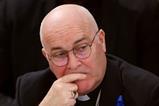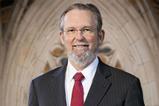The Church of England should not be adopting the language of Critical Race Theory or importing the US culture war on racism, says Dr Ian Paul

I am the son of a migrant, who came to the UK after the second world war as part of a despised ethnic group who experienced widespread prejudice. My mother changed her name and lost her accent in order to be accepted. She was Irish.
I am now associate minister at a multi-ethnic city church, where we need to have our Bible readings in four different languages on a Sunday. I am currently learning one of these languages in order to be able to relate better to part of our congregation.
Because of all this, I found Guy Hewitt’s article on racial justice profoundly depressing. I believe his entire approach is importing ‘culture wars’ language from the American context, which is deeply shaped by Critical Race Theory (CRT), and this will bring division and disagreement to the Church of England and fail to address the issue.
Hewitt’s language of ‘antiracism’ comes straight out of the US culture wars and Hewitt appears to claim that anyone who does not agree with the current approach of the Church of England’s approach to racial justice suffers from ignorance, fragility or illiteracy.
imposing quotas or virtue signalling doesn’t work
Hewitt’s article comes in the wake of a CofE post being advertised for a ‘Deconstructing Whiteness officer’ in Birmingham - until it was pointed out that this was racist and the advert was removed. Meanwhile, in York, a new Justice Education Adviser will need to run a course on Being White, in order to make people aware of their inherent racial privilege. Try explaining that to unemployed white working-class men on outer estates. Data from the Office of National Statistics shows it is ethnic minorities who flourish best in our education system, and white boys who do worst.
A practical problem with the approach proposed by Hewitt and others is that is simply that is does not work. The goals for York Diocese include quotas of Global Majority Heritage (GMH) people in particular roles - but the use of quotas angers those excluded and patronises those included, who feel they are only appointed because of their ethnicity. In fact the advert for the York job notes that clergy and congregations are already representative of the ethnic mix of the region. And research has shown that the ubiquitous ‘Unconscious Bias’ training not only fails to effect change, but can even make the situation worse.
why are we trying to atone for the sins of our ancestors? What is the theological basis for the idea that we inherit their guilt?
The outlook of Critical Race Theory is not just incidental or peripheral to this approach; it is at the heart of it. That is why the recent report from the Oversight report of the Church Commissioners, commenting on a ‘reparations’ fund, included this statement:
“We call for the Church of England to apologise publicly for denying that Black Africans are made in the image of God and for seeking to destroy diverse African traditional religious belief systems. This act of repair should intentionally facilitate ongoing and new sociological, historical and theological research into spiritual traditions in Africa and the diaspora, thereby enabling a fresh dialogue between African traditional belief systems and the Gospel. This work should reach beyond theological institutions and be presented in ways that will enable all Africans, especially descendants of the enslaved to discover the varied belief systems and spiritual practices of their forebears and their efficacy.”
At a time when the Church of England is, in theory, seeking to be more effective in mission and evangelism, it is extraordinary that it has issued a statement regretting its missionary past. As William More noted in The Spectator:
“If all beliefs and practices are as good and truthful as each other; if attempts to replace one set of religious ideas with another are wrong, then all Anglican missionary activity is wrong, and some of its bravest modern martyrs, the African Christians who suffered and died for their faith, were misguided.
“The broadness of the report’s spiritual demands has some deeply alarming implications. Surely there are ‘diverse African traditional religious belief systems’ which the missionaries were right to try to replace? Idolatry, witchcraft, twin infanticide (a practice in south-east Nigeria until it was all but abolished by the Presbyterian missionary Mary Slessor), cannibalism, human sacrifice – to name some of the most extreme.”
The earlier CofE report, From Lament to Action, included the claim that there are “foundations and principal theological frameworks which entrench racial prejudice across the Church of England’s traditions and doctrines” and that the Church has “theological foundations of prejudice and discrimination”. The goal, it appears, is not merely the implementation of ‘racial justice’, but the dismantling of the Church of England. High-profile campaigner Jarel Robinson tweeted two weeks ago: “Black and brown people will be free—when the Church of England dies.” He has just moved to a post in the Church in Wales.
The whole ‘reparations’ approach has major problems. First, why are we trying to atone for the sins of our ancestors? What is the theological basis for the idea that we inherit their guilt? Secondly, if we need to atone for this group, why not for others? The wealth of Britain was not derived from slave-trading, but from the industrial revolution - which exploited millions of unseen labourers in coal mines and iron foundries. Where is the compensation for them? What about my ancestors in Ireland, where millions died in the potato famine, and millions more driven from their homes - and many were even enslaved. Where is the reparation for that?
Steve Elers, a Maori, reflects on the complexities of demanding reparations from the pakeha (descendants of white settles) in New Zealand: “It’s well documented that one of my iwi [tribe] had a dispute over a feast with another iwi more than 200 years ago. It resulted in the killing of those attendees, and their bodies were butchered and became part of the feast. Do I need to apologise for my ancestors savouring members of another iwi? And is one apology enough or will my children and their future children have to apologise too? I am a registered member of several iwi across the country. If I had to apologise for each and every occasion my ancestors did something awful, I wouldn’t have time to do anything else.”
Last week I was in debate (see below) with Yemi Adedeji, who lives in Cambridge but is from Nigeria. He argued strongly for reparations, since the legacy of slavery has created a “wound in my soul”. But it then transpired that his ancestors were kings of their Nigerian tribe and they kept slaves—and so his family had themselves profited from slavery. So should he now pay reparations? And to whom?
There is a better way to address this whole question - to go back to the vision of the diversity of human, redeemed in Christ, we find in scripture. Churches are already the most diverse communities in our country. But it is fascinating to see how the writers of the New Testament carefully emphasise how diverse the communities of Jesus-followers are in their class, ethnicity, culture and language. Just read Acts 13 or Romans 16 to find people from completely different language groups and cultures united in Jesus.
How have we ended up with such a diverse group in our church? It was not by importing divisive CRT language from the US. It was not by making people feel guilty about their ‘whiteness’. It was not by imposing quotas, or virtue signalling, or making a power play. It was by taking each person, with their language and culture, seriously, and ensuring that they were welcomed and had an honoured place in the community of faith.
There is a better way to address these issues. At the moment, the Church of England strategy is not it.





































1 Reader's comment